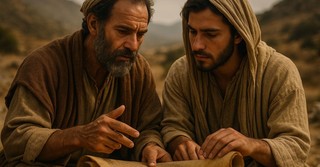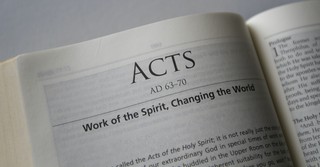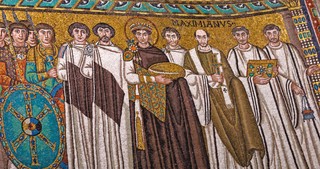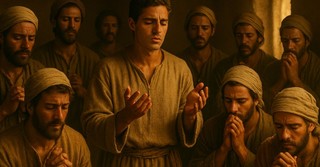Who Was Philip and What Does the Bible Say about Him?
Share

Some people call the book of Acts the fifth gospel. Luke wrote Acts as a second part to his gospel, detailing how Jesus, by the Spirit, birthed the church and spread the Good News throughout the Roman Empire. At the end of Matthew, Jesus famously gives what we know as the Great Commission, telling the apostles to go out and make disciples, teaching the new followers to obey the same teachings Christ gave while on earth.
Spreading the Gospel of Jesus required new disciples, people beyond the original twelve, to take up the mission, announcing the work of Christ and his Kingdom, present and future. Luke clearly records these new disciples, almost instant figures to spread the Good News.
Among the many new disciples, Acts tells us about Philip the Evangelist, a key link in the Body of Christ with lessons for us today.
Image created using AI technology and subsequently edited and reviewed by our editorial team.

What Biblical Passages Mention Philip?
Several Bible passages mention Philip the Evangelist.
Acts 6:1-6 contains the first mention of him. The early church started to grow, but with this increase in membership came a new conflict. The Holy Spirit had been given on the Day of Pentecost, a main Jewish feast requiring people from around the empire to attend. Many Jews from around the Roman world became disciples of Jesus and entered into regular community with local Jews still living in Judea. The Hellenistic Jews (separated from the Hebraic Jews by culture and language) complained about receiving less food from the church.
The apostles called on the people of the church to help them appoint seven men “full of the Spirit and wisdom” to make sure the food was distributed evenly. This would free the apostles to focus more on prayer and teaching the Word. The new, burgeoning church chose Philip as one of the seven, viewing him as a leader of integrity who followed the Spirit.
Acts 8 records Philip's evangelistic ministry. After Stephen’s martyrdom and the continued persecution of the church, many believers left Jerusalem and went back to their “homes” all around the empire. Philip went to Samaria, where he boldly declared the work of Christ (Acts 8:4-8). Before his ascension, Jesus had prophesied Samaria as the next region to get the Gospel after Jerusalem and Judea (Acts 1:8), as Christ had done to the woman at the well and her village, Sychar (John 4). Philip preaches there, and many Samaritans became disciples and were baptized. Philip performed miraculous signs like casting out demons and healing the sick. He was an evangelist in an area that marked a major step toward the Kingdom Gospel going out to the rest of the world.
The same chapter records an odd event (Acts 8:26-40). An angel leads Philip to the road between Jerusalem and Gaza, where the young man meets an Ethiopian eunuch, a royal official who was reading the prophet Isaiah. Led by the Spirit, Philip explains the prophecy and points to Jesus. The Ethiopian believes and Philip baptizes him in water close by. After the baptism, the Spirit takes Philip away, transporting him to Azotus, where he preaches in the towns until he reaches Caesarea.
Acts 21:8-9 includes the last biblical mention of Philip. The apostle Paul and his companions stay in Philip’s house in Caesarea. Luke was likely one of these companions and even calls him “Philip the evangelist, one of the seven,” connecting the man to one of the chosen servants in Acts 6. The text notes how Philip had four unmarried daughters who prophesied, implying his family operated in ministry by the Spirit in powerful ways.
Photo credit: ©Sparrowstock

How Is Philip an Important Figure in Acts?
Before his ascension, Jesus gave his followers a clear command, what we call the Great Commission. In Matthew 28:18-20, he told the apostles to “go and make disciples of all nations,” baptizing and teaching them to obey Christ’s teaching. Acts 1:8 expands this commission to include the necessary power of the Holy Spirit in the process. “You will receive power when the Holy Spirit has come upon you, and you will be my witnesses in Jerusalem, in all Judea and Samaria, and to the ends of the earth.”
Looking at these two passages, the apostles were to wait for the anointing of the Holy Spirit, preach the Gospel of the Kingdom, and teach new disciples to follow the doctrine of Christ. The Gospel wouldn’t be for Jews only but for all nations. The apostles would spread the Gospel first in Jerusalem, then Judea (the area around Jerusalem). Next would come Samaria, a land of people the Jews considered “half-breeds,” Israelites who had intermarried with other nations and had ancestors of unclean nations. After Samaria, the Gospel would go out to the rest of the world, to the ends of the earth.
If the apostles must teach new disciples to obey Jesus’ commands, then by necessity, this included the Great Commission. Philip the Evangelist shows how the apostles successfully passed on the mission to spread the Gospel, following the same apostolic model.
Luke shows us how Philip was known as a man who followed the Spirit, the central power needed to be witnesses and preach the Gospel. As such a man, Philip became a witness of Christ in Jerusalem, helping to bring relief and equality to the church members and even reconciling different ethnic groups.
Next, as the church is persecuted and people disperse from Jerusalem, Philip goes to Samaria (Acts 8), next on Jesus’ list in Acts 1:8. There, Philip also followed Matthew 28 by baptizing many of the converts. Philip becomes one of the first to evangelize outside of Jerusalem.
Later in Acts 8, an angel guides Philip to a place where he encounters the Ethiopian eunuch. Philip makes a new disciple and baptizes this African man, further fulfilling the Gospel being spread outside of Judea and Samaria, to the ends of the earth.
Finally, Philip had settled in Caesarea, able to host other evangelists like Paul and his companions, which probably included Luke himself. Luke did research for his gospel and Acts, and he surely interviewed Philip and got some stories from the man, who now had four daughters. These four daughters were women who operated in the spiritual gift of prophecy, showing how Philip’s family also ministered the Word of God.
While not an apostle, Philip literally fulfills Jesus’ commission in Matthew 28 and Acts 1, revealing the necessity of passing on the same mission to every generation of disciples.
Photo Credit: ©iStock/Getty Images Plus/lentolo

How Does Christian Tradition Add to Philip's Story?
The Bible doesn’t give any details about Philip before he shows up in Acts 6. However, scholars believe he was a Hellenistic Jew—a Greek-speaking Jew from outside Judea. He had a Greek name, Philip, which supports this. As a young man of age, he probably came to Jerusalem for Pentecost, hearing the apostles speak in tongues by the Spirit, and responded to the Gospel with repentance and received the Holy Spirit himself. Many of the Hellenistic Jews simply remained in Jerusalem, joining the new church, not going back to their homes elsewhere in the Roman Empire. Philip may have been one of those people. This background would have helped him see the discrimination against Hellenistic Jews as wrong and something he should help rectify.
Church tradition tells us that Philip remained in Caesarea for years ministering to believers. Based on his biblical background, he probably planted local churches. Some traditions suggest he became a regional bishop. We don’t have any historical record of how he died, so it may have been from natural causes.
Church tradition holds that Philip remained in Caesarea for many years, ministering to believers and likely planting or strengthening the local church. Some traditions suggest that he became a bishop in that region, though these details are not confirmed by Scripture. Unlike Philip the apostle—who was martyred in Hierapolis—Philip the evangelist likely died of natural causes.
The church has honored Philip the Evangelist as a model of Spirit-led ministry, including servant leadership and evangelism. The Eastern Orthodox, Roman Catholic, and Anglican churches remember him in their liturgical calendars, mostly on October 11. The Catholics have venerated him as a saint. Some churches and places are named in his honor.
Photo credit: ©Getty/Visual_Intermezzo

What Can Christians Today Learn from Philip?
Philip’s life reveals several examples for Christians today.
First, Philip teaches us the importance of following the Spirit. Jesus told the original apostles to wait for the Spirit before preaching the Gospel. Yet Philip shows us this wasn’t for the apostles alone. This remains true for anyone of each generation to become a leader in the church or an evangelist. Philip needed the Spirit to serve the church in something as simple as giving food. With his faithfulness in humble service, he grew in the Spirit, and God began to use him in evangelism. We must learn the same model. We first need the Spirit, and then we use this new power to humbly serve others. God will lead us to the rest.
Second, being led by the Spirit of Christ, Philip naturally preached the Gospel when he left Jerusalem. After persecution in Jerusalem, Philip could have shied away from preaching, but he instead took courage, declaring Jesus to the “least of these” in Samaria, a group of people normally rejected by Hebraic Jews. As a model, we should also learn how to fight our fears and worries to boldly preach the Gospel wherever we go. Especially, we must remember to reach out to the rejected and marginalized of society with the transforming love of God.
Third, Philip teaches us the importance of passing on the mission of God to the next generation. While the Bible doesn’t say Peter or John personally told Philip to evangelize, the young man’s actions reveal he absolutely understood the need for the Spirit and the urgency to preach the Gospel, baptizing them in the name of the Father, Son, and Holy Spirit. Further, he passed on the same gift to his daughters. Philip didn’t only make disciples, baptize, and lead the church, he even taught his own children to listen to the Spirit and do what God told them to do.
Philip teaches us that the same Spirit active in the apostles can empower us today. Upon being born again, we have received the same Holy Spirit. We remain within the urgent mission to be witnesses, preach the Gospel, baptize, and pass the mission on to others. It has been passed on to us, and we should do the same within the church family and our earthly families.
Image created using AI technology and subsequently edited and reviewed by our editorial team.
